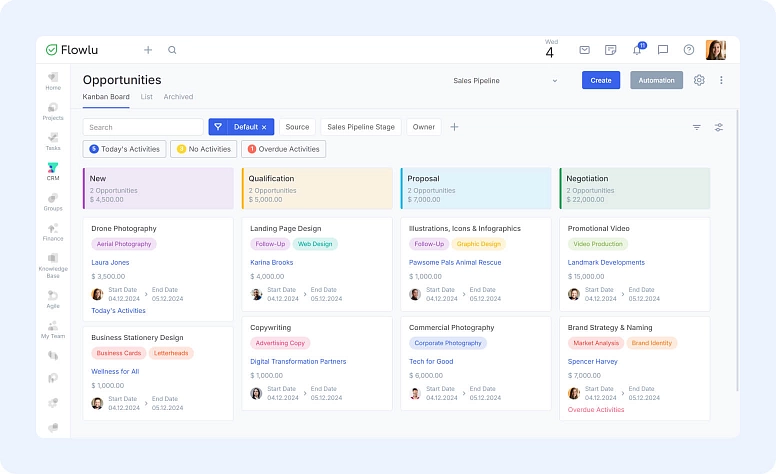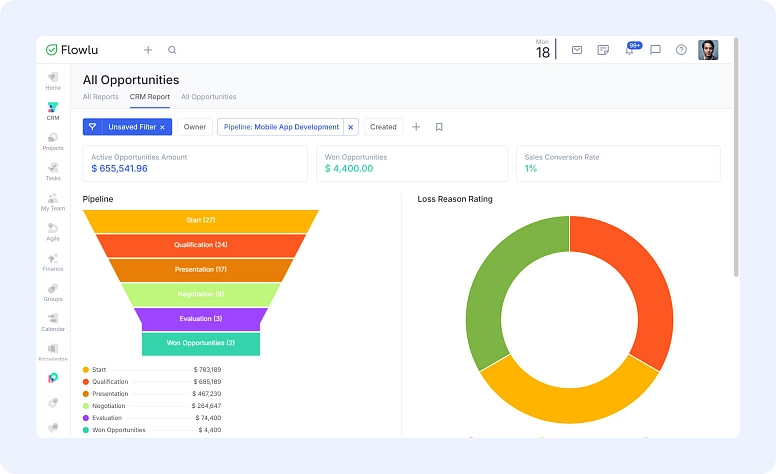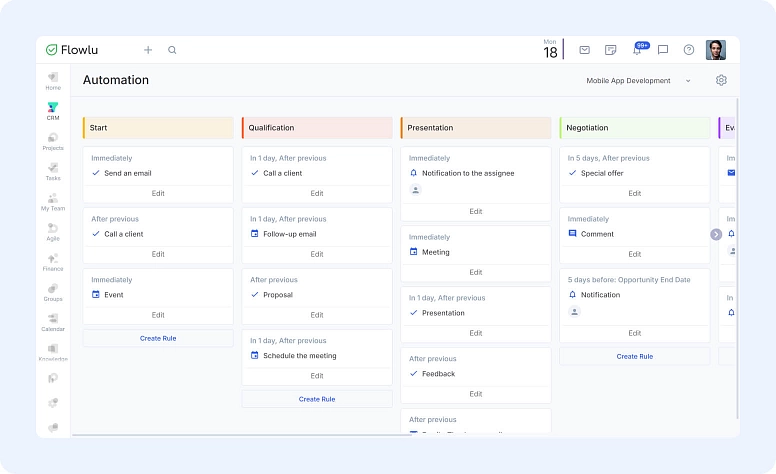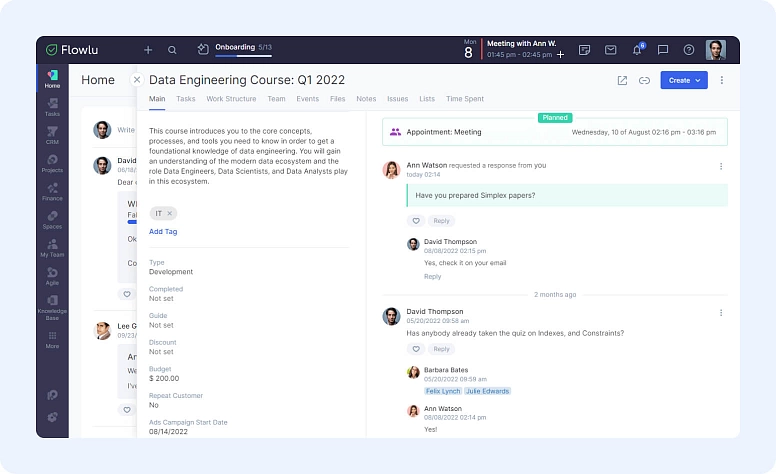Sales Tracking: 7 Best Practices for Small Businesses
That’s where sales tracking comes into play. Sales tracking refers to the collection, analysis, and reporting of sales data to understand how well a business is meeting its short-term and long-term sales goals. Sales tracking is an important metric for small businesses. Not only does it denote how many sales your business pulled through strategic sales efforts, but it also sheds light on aspects of the sales process, customer experience, and sales strategy and helps you make informed decisions in the future.
While most big businesses use a combination of sales strategies and customer relationship management tools for sales tracking, small businesses may struggle with defining and measuring key metrics of sales performance, which can lead to missed sales opportunities and a lack of a strong customer base in the long run. If you’re a small business struggling with streamlining your sales tracking processes, here are 7 best practices that’ll help you.
7 Best Practices For Sales Tracking As A Small Business
1. Set Clear Sales Goals
Sales tracking isn’t about hitting a few random numbers at the end of the week, it involves the creation of a sales cycle backed by thorough market research and successful business acumen. If you want to achieve certain sales goals or amp up your sales performance, you need to define measurable sales goals for everyone involved in the sales process.
What's the end goal that you want to achieve through sales tracking? Are you planning to increase the business revenue and reach out to a larger number of target customers, or are you trying to streamline the process of creating sales pitches that convert?
By defining your short-term and long-term goals, assigning appropriate Key Performance Indicators (KPIs) to your sales team, and actively tracking the progress of your goals, you can help your small business stay focused and agile. You can also make use of both paid and free sales tracking software to help monitor the sales performance of your teams against their goals in real time.
For example, if you’re a wedding venue management business based out of California and want to increase your sales for loft venues chosen for weddings, then instead of saying we need to increase our revenue, define your goal like this. ‘We need to increase our sales for loft wedding venues by 20% by the end of this Quarter.’
Key Takeaway: Setting clear and measurable goals gives small businesses direction and benchmarks for success.
2. Use a Centralized Sales Tracking System
A centralized sales tracking system that aims to improve sales pipeline management is better than storing the same piece of information a hundred times on different platforms. A centralized CRM system for tracking sales can not only help small businesses streamline their customer data and customer retention strategy but can also help them automate monotonous tasks and processes with the help of Artificial intelligence and simplified collaboration across teams.
In comparison to traditional methods of sales tracking, such as using Google Workspace or Microsoft Office for manually inputting data and then sorting through the database for management, centralized systems offer a real-time view of sales data for easier pipeline reports, can help with sales forecasting, reduce the rate of attrition, and can prove to be advantageous for team collaboration.
There are multiple work management tools and software solutions available for small businesses that can integrate sales tracking, customer management, and project reporting into one system for a holistic view of the entire process.
For example, Flowlu uses its online CRM features to streamline sales tracking processes across organizations while also offering project management, collaboration, task management, and financial management tools, all of which are extremely important for small businesses to execute and manage their sales tracking from end-to-end.
Key Takeaway: A centralized system ensures accuracy, accessibility, and efficiency in managing sales data.
3. Track Sales Activities, Not Just Results
Successful sales aren’t made in a day. There are hundreds of hours of work that go behind it; that’s why tracking all the activities that encompass the sales funnel can help your small business make informed decisions regarding what’s working and what isn’t. So, instead of tracking just the final results, tracking daily sales activities like calls, meetings, and follow-ups can give you deeper insights into what’s actually going on behind the scenes. It could also be something as simple as tracking leads through your digital business cards. Check online for customized digital business card solutions to find the one that aligns with your business.
How does your sales team source qualified leads? What’s your ideal customer, and how do you find them? Is social media an integral part of finding new leads, and if yes, which social media platforms work the best for your business?
When you start to focus on the journey that your sales executives and potential customers take to reach the point of the final deal, you’ll be able to identify and create a sales funnel that is successful and increases your business’ profitability.
As a small business owner, it can be hard to be a part of every step of sales tracking. To make it easier for yourself and your team, you can automate certain important aspects of sales activities to be tracked through work management software for higher efficiency.
For example, a work management system that tracks how many calls are being received throughout the day can give you insight into when people are most likely to respond to marketing and sales-related emails and calls related to your business.
Key Takeaway: Monitoring daily activities helps businesses maintain momentum and identify bottlenecks before they impact sales.
4. Regularly Analyze Sales Metrics
Analyzing sales metrics regularly can help small businesses pick up on some big-picture stuff, such as the average time and money spent on converting a lead. Some of the key sales metrics that small businesses should regularly review include lead conversion rates, customer acquisition cost, average deal size, gross margin, churn rate, customer lifetime value, and quota attainment.
Analyzing these metrics helps businesses understand what works and where improvements are needed.
Of course, depending on the needs of your small business, these metrics can be swapped with other, more relatable metrics, but the idea remains the same. If you wish to optimize the performance of your sales strategy, you should invest in CRM software for small businesses that offers built-in reporting capabilities for generating insights feasibly.
Key Takeaway: Frequent analysis of sales metrics helps small businesses adjust their strategies and optimize performance.
5. Automate Sales Processes Where Possible
Another step you can take to simplify your sales tracking process, especially as a small business, is automating repetitive tasks like data entry, follow-up emails, or generating reports that can save your sales teams a lot of time and effort, making their work more productive.
Not only is the process of automation helpful in building a loyal customer base and making the sales cycle more efficient, but it also improves consistency across the board and reduces the chances of human errors during sales operations.
It would be worthwhile for you to explore and understand the various automation features within your choice of work management software to make sales processes time saving. For example, some automated features include the use of AI to fill data entry, write emails, build a knowledge base for internal and external stakeholders, make brainstorming easier, and document creation faster in a single click.
Key Takeaway: Automating key sales processes improves efficiency, allowing sales teams to focus on high-impact tasks.
6. Keep Your Sales Pipeline Healthy
A well-balanced sales pipeline management where leads constantly move through different sales funnel stages, requires personalization combined with professionalism for effective sales operations. As a small business owner, it’s important for you to nurture new leads and ensure a continuous flow of prospects to help the business grow. To keep the sales pipeline healthy, use a combination of customer satisfaction approach combined with marketing gimmicks to grab the attention of users.
For example, using customer segmentation in email marketing, developing brand-specific content marketing strategies for social media platforms, and aligning teams to offer a stellar experience throughout the teams can help you build a steady flow of potential customers who are eager to buy.
Apart from that, you can also use sales pipeline management features in your chosen work management software to conduct surveys, score leads based on which step of the sales pipeline they’re a part of, and reach out to leads after successful conversion to learn more about their experience. This will help you monitor the health of the sales pipeline using a combination of personalization and automated applications.
Key Takeaway: A healthy pipeline ensures a steady flow of revenue and allows for better sales forecasting.
7. Collaborate Across Teams
Collaboration is an integral part of a successful sales tracking process. A strong collaboration between sales, marketing, and customer service teams can improve sales tracking and customer experiences, leading to healthy sales pipeline management. More often than not, it’s easier to streamline the process across the teams when a small business is still getting in the game. Sharing the core values of your business team and encouraging them to offer the same quality of service and experience can help your business gain some credibility in the marketplace.
Work management systems can play an important role in breaking down silos and facilitating cross-department communication. For example, Flowlu makes team collaboration and communication more feasible through its extensive online collaboration tools. When all teams are connected to each other, even in a remote setting, it becomes so much easier to offer your customers a feeling of cohesiveness and understanding, irrespective of who they talk to.
More than that, there are immense benefits to sharing sales data and insights across the organization. Some of them include driving better business decisions, developing effective sales and marketing strategies, the accuracy of data, the higher opportunity for innovation, and improving customer experience, among others.
Key Takeaway: Cross-team collaboration enhances sales and ensures that every customer interaction is aligned.
Bonus Tip: Use Industry-Specific Tools for Sales Tracking
Sales tracking isn’t one-size-fits-all—each industry can benefit from tailored tools designed for their unique needs. Whether you’re in retail, hospitality, or event management, finding software that aligns with your workflow is crucial.
For example, businesses in event planning and venue management often rely on platforms like Breezit to manage client bookings and track leads effectively. These tools are particularly beneficial for organizing and marketing loft venues chosen for weddings, helping businesses streamline communication and improve their booking conversions.
By aligning your sales strategy with industry-specific software, you not only save time but also gain valuable insights into your sales pipeline. These tools can integrate with CRM systems to ensure you never miss a follow-up or lose a lead due to disorganization.
Key Takeaway: To maximize efficiency and boost conversions, choose tools that cater specifically to your industry. From managing customer data to tracking the progress of potential deals, tailored software ensures your sales process runs smoothly from start to finish.
Conclusion
Effective sales tracking is the backbone of successful small businesses. While most businesses rely on a combination of human and external resources to make sales tracking possible, work management software solutions like Flowlu can make a big difference for small businesses that aim to compete in the market but are short of time and resources.
If you’re a new small business planning to streamline your sales tracking processes to grow your business, adopting a comprehensive work management system that automates your monotonous tasks and offers deep insights into the sales pipeline management can improve your employee productivity and engagement across the organization, helping you create lifetime value for your customers.
Irrespective of the current size of your business, if you aim to scale it above and beyond, you need sales tracking. Sales tracking can help you gain a better understanding of your sales funnel, streamline sales pipeline management, improve team performance, and enhance customer experience.
By tracking sales activities as a small business, you can gain deeper insight into how the sales process functions and which sales funnel features are useful for future growth. Every step of the sales process needs to be observed to create a system for sales pipeline management. When you keep track of small activities, such as the number of times your team has followed up on a lead or how many positive customer reviews have been dropped on your website immediately after a sale, you can re-allocate your resources in a more productive manner to achieve your sales goals and even surpass them in the long run.
Flowlu is a comprehensive work management platform that makes it easy for small business owners to streamline their sales tracking process through multiple features such as online CRM, knowledge management, task creation, collaboration tools, and project management. You can use a combination of these tools to keep track of your sales activities and improve your sales pipeline management.













